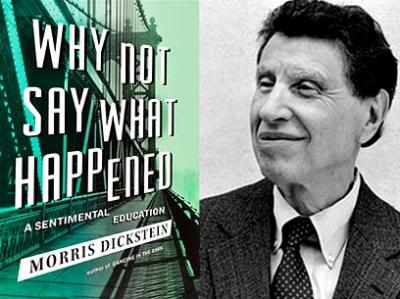The Happy Intellectual

“Why Not Say
What Happened”
Morris Dickstein
Liveright Publishing, $27.95
In this beautifully wrought, rather romantic memoir, the renowned literary critic Morris Dickstein recounts the tale of a quintessential American journey. It is a story that begins in a loving, happy, but strictly monitored Orthodox Jewish household on the Lower East Side of Manhattan. Mr. Dickstein, born in 1940, attended a Yeshiva school, where he studied religious texts in the mornings (in Yiddish) and received a secular education (in English) in the afternoons.
On the surface, recounts the author, he could not have been a happier child. “I had the swagger of the precocious kid, always merry and bright, who spoke early and did clever things. Yet I felt somehow on trial, rarely free of my parents’ watchful eyes.” His mother’s anxious, exaggerated worries about his health were to become a leitmotif throughout much of his adult life.
Mr. Dickstein, now distinguished professor emeritus of English and theater at the Graduate Center of the City University of New York, eventually left the warm embrace of Orthodox Jewish life, but as this memoir makes clear it was not without ambivalence and conflict. Even while attending Columbia University he was enrolled as a student at the Jewish Theological Seminary; it was as if he were preparing for two different lives. At last, having become wholly enchanted by his literary studies — especially English and American literature — he dropped out of the seminary just shy of graduation.
Thus began Mr. Dickstein’s remarkable 40-plus years as an essayist, author, professor, public intellectual, and cultural historian.
There is a generous, modest, self-effacing spirit that pervades these pages, as well as a good deal of wit and the occasional gossipy tidbit (e.g., Susan Sontag’s self-serving revision of her past). Sexually naive when he arrived in New Haven as a graduate student, he falls deeply in love with the slim and elegant L. But he cannot imagine himself in the guise of a swashbuckling lover. As he remarks, he did not personally believe himself the answer to Freud’s famous question: “What does a woman want?” However, the love affair does proceed apace, and there is a very funny riff when young Morris is anticipating a tryst with L. in a friend’s empty apartment. As he looks forward to this magical evening, the author finds himself in a state of constant arousal, and he worries about the fact that a male in a state of tumescence for more than four hours may constitute a medical emergency!
Mr. Dickstein is fortunate to have entered his chosen field in the heyday of some of the great literature teachers of the late 1950s and early 1960s, such as Lionel Trilling and Jacob Taubes (at Columbia), F.R. Leavis (at Cambridge University), and Harold Bloom, Geoffrey Hartman, and Rene Wellek (at Yale). As the critic Molly Haskell has written, this account of a passionate young scholar’s passage through the sober ’50s and the tumultuous ’60s is “an intellectual joy ride.”
As a small example, here is the memoirist recalling what it felt like to teach a particular poem when he himself was in his late 20s: “[R]eading literature simply for pleasure and expounding it for students are radically different experiences. Having spent years with these poets, still I wondered whether I could fully express what gave them such significance for me. Wordsworth’s Immortality ode, evoking his wild Edeni childhood and receding past, poignant in his fear of declining powers, had always moved me deeply, often to tears. I had read it aloud to L. when I was courting her, as it offered coded insight into who I really was, my emotional landscape.”
Candid and beautifully written, “Why Not Say What Happened” invites the reader into that landscape, and it is an invitation well worth accepting.
Maggie Scarf’s books include “Unfinished Business: Pressure Points in the Lives of Women.” A fellow at Yale’s Jonathan Edwards College, she lives in Sag Harbor.
Morris Dickstein lives part time in Sag Harbor.
